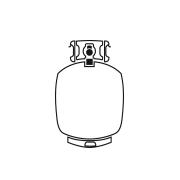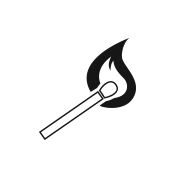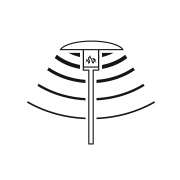Fuel Type
How much bioethanol fuel do I need?
How do I use bioethanol fuel?
Bioethanol fuel (also called biofuel or ethanol) is a clean-burning, plant-derived liquid that can be used as a renewable resource substituting others such as propane, wood, or natural gas. This cost-effective alternative emits no harmful chemicals, making it safe to burn inside or outside of your space.
If you are using a 13 oz. can of fuel, the burn time will last 2-3 hours. To store this fuel, simply keep it away from any heat source.
Here are the steps to start burning your biofuel:




Do you sell and ship Propane Tanks?
No, we do not sell or ship Liquid Propane Tanks. For fire features we sell that do use Propane, these LP tanks are sold separately. We recommend purchasing your fuel from your local hardware store.
What type of grill should I buy?
Gas Grills
This is the most popular type of backyard grill. They can run either on bottled propane or natural gas from your utility provider. Most gas grills are designed for propane, but can be converted to natural gas fairly easily. Some people argue the merits of propane or methane, but there is very little difference between the two. If you have access to a natural gas line, utilizing it is certainly more convenient and less expensive than refilling propane tanks.
Best for: The chef who wants to quickly fire up the grill and cook a meal without having to worry about the preparation and cleanup of charcoal.
Disadvantages: Flavor and price. Although some gas grills have small smoker boxes, you will only get a hint of smoke flavor compared to a genuine charcoal grill or smoker; you really can’t smoke meats without a charcoal grill. While inexpensive gas grills do exist, the mechanisms involved ensure that they will always be more expensive than a comparable charcoal model.
Charcoal Grills
These grills use charcoal briquettes as the fuel and fire power for cooking. Cooking with charcoal is more time-consuming and expensive than a gas grill, but some people prefer the taste of cooking with charcoal, especially when it is made of natural wood.
Best for: The purist. If you long for that smoky, grilled flavor or you enjoy smoking meats, the only way to achieve both is with a charcoal grill. Charcoal burns at a higher temperature than gas, allowing a skilled grill master to easily sear meat. Cooking with charcoal also has a distinct romance that is clearly lacking with a modern gas grill.
Disadvantages: Time involved and the expense of charcoal. With a charcoal grill, you can’t just fire it up and throw something on it. Getting the grill ready to go takes at least 45 minutes of starting the coals and pre-heating the grill. You will also need to spend some time cleaning up your grill and disposing of the ashes when you’re done. Purchasing charcoal is also quite expensive when compared to gas.
Electric Grills
Electric grills are not hybrids, but are powered 100% by electricity and cook meat using heated grill plates – no fire required. There are indoor and outdoor varieties available.
Best for: City dwellers who are prohibited by fire regulations from using gas or charcoal grills. Check your local laws and building regulations to make sure that the grill you buy doesn’t violate any codes.
Disadvantages: Taste. Electric grills can produce results that look like their fire-powered cousins (grill marks are easy to come by), but they are not a replacement for the traditional grill. The smoky flavor is all but lost when using electricity.
Portable Grills
These grills can run on propane or charcoal, but have one thing in common – they are easily transported from one location to another.
Best for: The tailgater. If you love a good outdoor picnic or a perfectly cooked brat in the parking lot before the big game, this is the grill for you. You can buy portable grills of all different styles for picnics or for tailgating.
Disadvantages: Size. You can’t cook hamburgers for all 50 of your closest friends and fans at the same time. And if you’re cooking for a large crowd, you might just be on grill duty all day.
Does an electric heater cost more than a gas unit to operate?
Operating costs vary by region. Nationwide, electric heaters are less expensive than propane and are competitive with natural gas. Depending upon the total hours of usage, electric heaters normally have a much lower cost of ownership when factoring in purchase price and maintenance needs. Basically, this means that while it can cost more per hour to operate an electric unit in some areas, it typically takes 7-10 years to save enough money operating on gas, to recover the substantially higher purchase price and cost of regular maintenance for a gas heater.
Why choose an electric heater, rather than a gas heater?
Electric heaters are over 90% efficient and are perfectly safe for use indoors or outdoors. They are also economical to operate and require little maintenance beyond periodic cleaning. Unlike gas heaters, there are no valves, ignition components, moving parts or burners to maintain or repair. In addition, electric heaters produce no sound, odors, or toxic emissions. An electric heater is also easier to use. Enjoying electric heat is as easy as flipping a switch. You can adjust the intensity of an electric heater infinitely from zero to 100% of power. By contrast, gas heaters only produce infrared energy on their highest possible settings.
What do I need to connect my gas fire pit to a standard 20 lb. propane tank?
What do I need if I want to use propane for my gas fire pit?
How do Natural Gas and Liquid Propane compare?
| Natural Gas | Liquid Propane |
|
Advantages:
Disadvantages:
|
Advantages:
Disadvantages:
|
What is a BTU?
In the fire industry, BTU stands for British Thermal Unit, which is a unit of energy equal to about 1.06 kilojoules. It is approximately the amount of energy needed to heat one pound of water by one degree Fahrenheit. You can compare fire features by their heat output potential, or BTU rating.
Do gas burning fire pits or fireplaces product more heat than wood burning ones?
Gas burning fireplaces do not produce more heat than burning actual wood, but they can come pretty close. Additionally, there are a lot of advantages to burning natural gas or propane rather than wood. Gas burning fireplaces are better for the environment. Governments are regulating more and more the use of burning real wood. There is no mess, ash, or smell to deal with that is common with burning wood. Gas fireplaces do not produce sparks or embers that can start wildfires. Gas fireplaces are efficient and easy to control. They also allow you to get very creative with your design and decor.
Showing items 1-11 of 11.













































